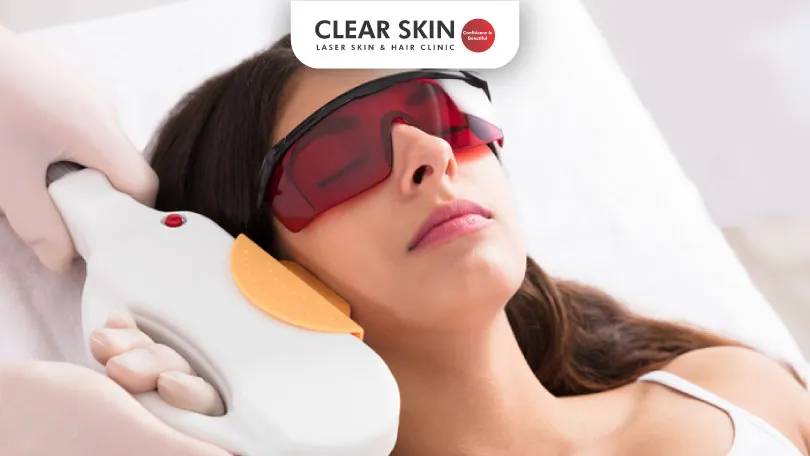Intense Pulsed Light (Ipl) Skin Rejuvenation Treatment

Written by Clear Skin Content Team | Medically Reviewed by Dr. Dhanraj Chavan on September 05, 2023

IPL stands for Intense Pulsed Light. A highly energized, handheld, computer-controlled flashgun produces an intense, visible, broad-spectrum pulse of light, generally in the visible spectral range of 400 to 1200 nm.
Table Of Content
- The Meaning and Science Behind This
- Why should you get IPL Skin Rejuvenation Treatment?
- Pre Treatment
- Steps during Procedure
- Recovery
- Risks and Side Effects
- IPL vs. Other Skin Treatments
- conclusion
The Meaning and Science Behind This
IPL stands for Intense Pulsed Light. A highly energized, handheld, computer-controlled flashgun produces an intense, visible, broad-spectrum pulse of light, generally in the visible spectral range of 400 to 1200 nm. Various filters are used to rule out lower wavelengths, especially potentially damaging ultraviolet light. The resulting light has a spectral range that targets specific structures and chromophores (e.g. melanin in hair, or oxyhemoglobin in blood vessels) that are heated to the point of destruction and reabsorbed by the body.
This is not only used in hair removal procedures but also for photorejuvenation therapy in which skin pigmentation, acne, wrinkles, and other skin ailments are cured. IPL is increasingly used in ophthalmology as well, to treat evaporative dry eye diseases due to meibomian gland dysfunction.
The laser/IPL device emits a range of light waves that are targeted at hemoglobin or melanin. The light beam passes through the skin and is absorbed by either hemoglobin or melanin resulting in the damage of the blood vessel wall or fragmentation of melanin pigment. These tiny vessels and the melanin pigment are then absorbed by the body, rendering them less visible.
IPL light encourages the production of collagen, a natural protein that fills in wrinkles. 5 IPL photo facial sessions that target the whole face, spaced 3 weeks apart are usually advocated for dramatic results.
Why should you get IPL Skin Rejuvenation Treatment?
If you have any of the following conditions and your general health permits you, you are an ideal candidate for this treatment
Pre Treatment
- Stay moisturized and hydrated for at least a week before the procedure
- Avoid overexposure to the sun and wear sunscreen with SPF 30 or higher
- Stop smoking at least six weeks before undergoing surgery so that your body can heal better
- Avoid taking aspirin, certain anti-inflammatory drugs, and some herbal medications that can cause increased bleeding
- Do not consume certain antibiotics and topical creams such as retinoids (Retin-A) that affect skin sensitivity
- If you have herpes, your plastic surgeon may ask you to take antiviral medication to reduce the chance of an outbreak
- Regardless of the type of surgery to be performed, hydration is very important before and after treatment for safe recovery
- Make sure you have someone who will stay with you overnight, after the surgery
- Do not wear any make-up on the day of the treatment
Steps during Procedure
- Medication will be administered to you to reduce discomfort
- You will be shown into a special laser room
- Your professional will give you eye pads or special glasses
- A cool topical gel will be applied on the skin that is required to be treated so that you don’t feel the intensity of the heat
- The glass surface of the instrument is then placed on this area of skin and flashes light out in pulses. You may feel a sting
- The nurse will wipe out the gel, wipe your face with a warm cloth and apply a moisturizer with sunscreen
- If your face swells, an ice pack will be given to you.
Recovery
- You will be kept in an observation room for some time in case an emergency arises
- Recovery time will depend on the intensity of your condition, its nature, and your skin
- Redness will fade away within a few hours but if your skin is very sensitive, this may take a few days
- Stay away from sunlight as much as you can and wear sunscreen
- Do not pick at your skin
- Do not use hot water
Risks and Side Effects
- Minor redness and swelling
- Hyper-pigmentation and hypo-pigmentation in rare cases
- Bleeding and blistering in very rare cases
- Allergic reactions and infections
IPL vs. Other Skin Treatments
Unlike
- Dermabrasion
- Laser treatment
- Chemical peels
- Fraxel or fractional laser treatment
- Photodynamic treatment.
IPL does not eliminate the upper layer of your skin and is very gentle. Recovery takes a very short period of time and discomfort is minimal.
Do You Know?
Roughly 250 Patients Are Treated
Everyday By These Dermatologists
(You are one click away from flawless skin)
Meet Our Dermatologist!
Conclusion
IPL Skin Rejuvenation Treatment is a versatile and non-invasive procedure that targets various skin conditions such as hyperpigmentation, wrinkles, and rosacea by using broad-spectrum light pulses. It is a gentle alternative to other skin treatments with minimal discomfort and quick recovery times.
Proper pre-treatment care, such as staying hydrated and avoiding sun exposure, enhances the procedure’s effectiveness and safety. For those interested in addressing specific skin concerns, consulting a qualified dermatologist in Pune can provide personalized advice and treatment plans.
Further Reading
How to Build an Acne Treatment Routine for Your Skin Type in Pune?
Clear Skin Clinic Pune reviews: 4.9/5 stars across 13,271+ verified reviews. Real patient experiences, treatment timelines & acne success stories.
Does Kajal Cause Dark Circles Demo
Not all dark circles come from kajal. Know the real causes, dermatologist advice, and proper makeup removal methods to protect your eyes.
HydraFacial Treatment in Pune | Cost, Benefits, Process & Results
Get instant glow with HydraFacial in Pune. Safe for sensitive skin, no downtime, visible results. Book dermatologist-supervised HydraFacial at ClearSkin.
Non-Surgical HIFU Treatment in Pune | Skin Tightening
Looking for HIFU treatment in Pune? Get safe, dermatologist-led skin lifting for face, jawline, and neck with no downtime.
Have thoughts? Please let us know
We are committed not only to treating you, but also educating you.





